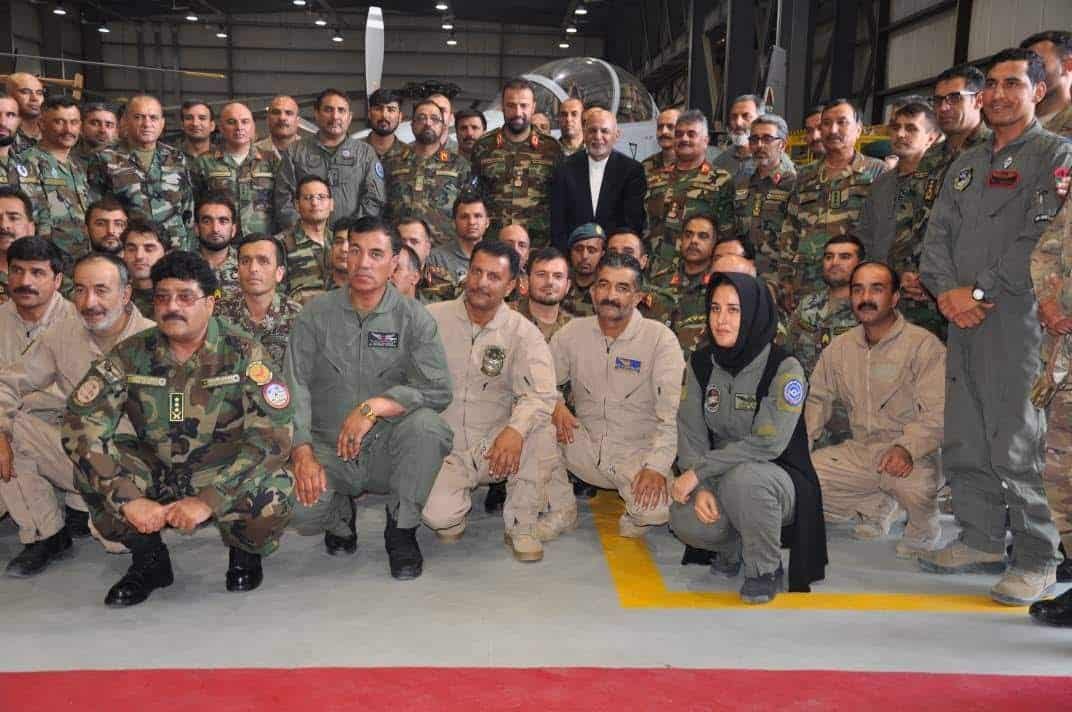
Hasina Omari with her entire squadron with the Afghan Air Force take a picture with then-president of Afghanistan, Ashraf Ghani, in 2020. COURTESY OF HASINA OMARI
‘All women are great women’ says Afghanistan’s first female fighter pilot, now living in Owensboro
BY ELIZABETH WONG BARNSTEAD, THE WESTERN KENTUCKY CATHOLIC
By 33 years old, Hasina Omari has survived familial disapproval of her career choices (becoming Afghanistan’s first female fighter pilot), nearly 370 flight hours of night and weekend missions, and expecting a baby while escaping the Taliban’s takeover of her home country.
Today she is happy to live with her family in Owensboro, Ky., where they have been assisted by Catholic Charities of the Diocese of Owensboro while resettling in the United States, safely out of danger.
She recently shared her story with The Western Kentucky Catholic.
Ever since she was a child growing up in Afghanistan, Omari wanted to become a jet pilot. And throughout her childhood, her family and friends affirmed this idea.
Until she grew up – and the encouragement stopped.
A few Afghan women have become pilots in recent history – including Niloofar Rahmani, the first female fixed-wing pilot for the Afghan Air Force – however, it was still not seen as a socially-acceptable role for women in Afghanistan.
“But I didn’t give up,” said Omari. “I tried to convince my family for seven years… they weren’t convinced, especially my mom and my big brother.”
She said her twin brother supported her, and her older sister tried to help her get admitted to a pilot school in India, but it proved too expensive.
“But I tried and tried,” said Omari.
Finally, “my father said okay – but that I must be like Mustafa Qahraman!” she said, in reference to a famous pilot in Afghanistan history. “My father loved him.”
“If you want to be a pilot, you must be like him,” her father told her.
She was grateful for the support she received from her family members – especially her twin brother – but her mother continued to struggle with the idea of Omari becoming a pilot.
“It hurt, but I continued,” she said. At last, “I told my mother this is my wish; this is what I want to do.”
She said that after stating her true feelings on the matter, “my mother finally accepted this is what I want to do,” said Omari.
Omari began working with the Afghan Air Force and went to the Czech Republic in March 2016, where she studied fixed-wing. She received a scholarship and financial aid for her studies from the United States.
“After 15 months’ training, I came back to Afghanistan,” she said, adding that she and one other woman were the only females in the program. “My colleague studied fixed-wing; I applied for the fighter aircraft. Then I studied almost nine months for that.”
Omari said that at that point, “everyone was proud” of her – including her mother.
Before too long, Afghanistan’s first female fighter pilot was doing “day and night missions, weekend missions; I worked hard,” she said.
She ended up flying a total of almost 370 hours’ worth of missions.
“My general commander would say, ‘She is braver than any man! Hasina is the first to say, ‘I am going there,’” Omari recalled.
She did not limit herself to her work as a pilot, either. Omari found fulfilment in helping with Afghan women’s equality and education initiatives, assisting as an interpreter, and spreading awareness about drug abuse.
When she married her husband, their families – especially her in-laws – argued that she should quit her job and become a housewife like other Afghan women. With her husband’s support, however, Omari pressed on with her professional calling.
Then they began receiving threats from the Taliban.

Hasina Omari with her entire squadron in the Afghan Air Force, along with their United States instructors, in 2020. COURTESY OF HASINA OMARI
After about eight months into her role with the Afghan Air Force, her husband, who worked in Afghanistan’s government, received a message from the Taliban wanting him to work for them. They also wanted Omari to quit her job and stay home as a housewife. Otherwise, the Taliban’s message said, they would kill them.
Omari and her husband ignored this threat and continued with their jobs – until a family member of her husband received a letter from the Taliban threatening to kill Omari and her husband. Her husband’s family had already experienced the death of several relatives at the hands of the Taliban, and they knew to take this threat seriously.
Omari and her husband received help to evacuate Afghanistan, and traveled around to several countries in hopes that a moving target would be harder for the Taliban to discover.
Not long after, the Taliban took control of Afghanistan.
And adding to the strain was the fact that Omari and her husband were expecting their first child.
“When Afghanistan fell, I was seven months pregnant,” said Omari.
Omari and her husband, together with approximately 150 other U.S.-supported Afghan pilots and their personnel, had to make an emergency landing in Tajikistan.
Due to the sudden landing, which meant a lack of proper protocol, the Afghan pilot group’s devices were confiscated, and they were detained in a sanatorium in a rural Tajik region.
“It was a really bad journey,” said Omari. “We were not allowed to talk to our family, even to tell them we were ok. It was really, really tough.”
She said of the 150 pilots, she and one other woman were the only females present.
Thankfully, “my husband was there with me, but the other girl was on her own,” said Omari.
The tension continued to rise as international governments debated what to do with the Afghan pilots.
“They made my pregnancy political,” said Omari. “They were telling people that I couldn’t be moved, that I was in pain, but it was all lies. Everyone was blaming me; it was hard.”
In not being able to leave, “I was really worried about my baby while I was there,” she said.
Eventually Omari obtained a mobile device, with which she secretly texted her American flight instructor that she was, in fact, healthy and safe.
“In my ninth month of pregnancy, the U.S. Embassy withdrew us,” said Omari, explaining that they were flown to the United Arab Emirates (UAE). “They had me say I was seven months pregnant, or else I would not have been allowed to travel!”
Her child was born nine days after they landed.
After seven months in the UAE, their family of three was flown to the United States and taken to Virginia.
“We stayed there 21 days,” she said. “After that, they asked if we had any family in the United States” with whom they could stay.
She and her husband, however, were the first of their families to come to the U.S., so they were sent to Evansville, Ind., where they lived for seven months.
Then, with the help of Khaibar Shafaq of Catholic Charities of the Diocese of Owensboro, they applied for asylum. They also learned that the Afghan community was thriving across the river in Owensboro, Ky., so they moved there in November 2022 with help from Catholic Charities and the International Center of Owensboro.
Omari is grateful for the slower pace of life in the small Kentucky city. She and her husband have welcomed a second child, and enjoy settling into their new hometown – having been granted asylum in December 2022. Catholic Charities and the International Center are available if they ever have questions or need assistance.
“There are more Afghan families here in the community,” said Omari, adding that she appreciates “talking with each other, giving to each other, and I even have American friends, too!”
Down the road, Omari is open to considering future aviation opportunities, but that will be a while since she is still working on obtaining her green card. For now, she is happy to be safe with her family.
Reflecting on her varied experiences, Omari said she has concluded that “all women are great women,” no matter where their paths lead them.
“Whether doing big things for society or staying at home with children, I appreciate all women,” she said.
Originally printed in the March 2024 issue of The Western Kentucky Catholic.
Correction: An earlier version of this story mistakenly used the name Ahmad Shah Massoud in place of the correct name, Mustafa Qahraman.

